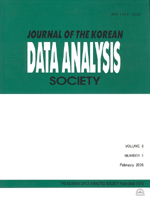외식과 보건의료지출간의 상호관계에 관한 연구
A Study of Interrelationship Between Eating-out and Health Care Expenditure
- 한국자료분석학회
- Journal of The Korean Data Analysis Society (JKDAS)
- Vol.13 No.4
-
2011.082051 - 2062 (12 pages)
- 16

본 연구의 목적은 외식과 보건의료 소비의 상호관계를 분석하는 것이다. 분석을 위해 1993년과 2009년 사이의 통계청에서 제공하는 가계조사자료를 활용하였다. 식료품, 외식, 보건의료 및 기타로 구성된 준이상수요체계 모형을 설정하고 반복적 표면 무관회귀방법으로 추정하였다. 추정 결과로부터 산출된 식료품과 외식 수요, 보건의료 수요의 자기가격탄력성은 각각 -0.87, -0.83과 -1.95로 식료품과 외식 및 보건의료 가격이 인상됨에 따라 식료품 수요와 외식 수요 및 보건의료 수요가 감소함을 파악하였다. 식료품 수요와 외식 수요 및 보건의료 수요의 소득탄력성은 각각 0.72, 1.04와 1.05이고, 본 연구의 주목적인 외식가격-보건의료 소비의 교차가격탄력성은 -0.13으로 산출되었다. 이를 통해 외식 가격의 인상이 외식 수요 자체를 줄일 뿐 아니라, 보건의료 소비를 감소시킴을 확인할 수 있다. 따라서 외식가격정책을 통해 외식으로 인한 건강상의 실질적인 지출을 억제시킴으로써 외식으로 인한 국민건강의 악화를 어느 정도 줄일 수 있다는 실증적 근거를 제시하였다.
The purpose of this study is to analyze the interrelationship between eating-out and health care consumption. We used the ‘Household Income and Expenditure Survey Data’ supplied by the National Statistics Office for the period of 1993 - 2009. We set up 4 demand equations: food, eating-out, health and others in AIDS model and estimated the system with the iterative SUR method. The result showed that the own-price elasticities of demand of food, eating-out and health care are 0.87, -0.83 and -1.95, respectively and the cross price elasticity between price of eating-out and consumption of health care is calculated as -0.13. This result implies that the increase of eating-out price does not merely cause the decrease in eating-out demand, but also will reduce the expenditure of health care. Therefore it is empirically revealed that the price policy of eating-out can reduce the deterioration in national health be caused by eating-out.
1. 서론
2. 선행연구
3. 추정 모형 및 방법
4. 자료 및 외식의 정의
5. 추정결과
6. 결론
참고문헌
(0)
(0)